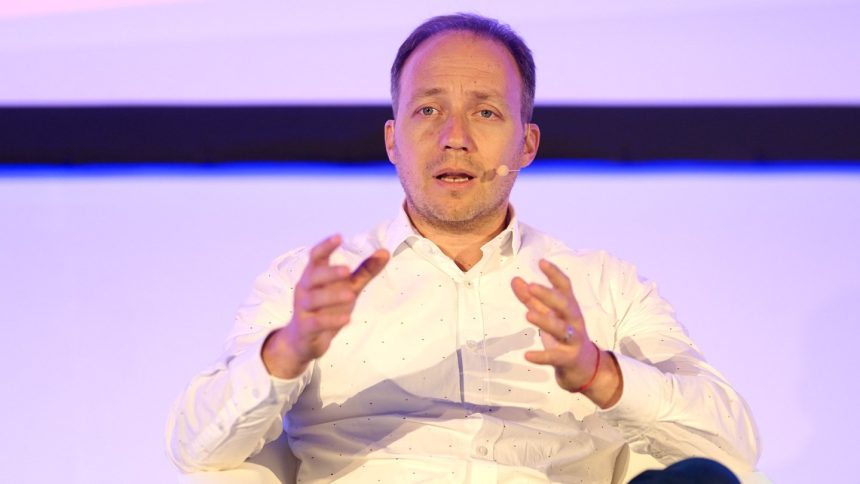Paprika Studios and Seefood TV Execs Talk Formats — and No, This Is (Mostly) Not About Cooking Shows
I know, I know. When you hear Paprika, Seefood and TV, you may be thinking that this is all about cooking shows … and that the writer of these lines doesn’t know how to spell “seafood” correctly. But no, this is all about the final session of Wednesday’s NATPE Budapest events schedule.
“Format Futures: How to make a splash on the global stage” was its title. And the speakers — this is where the food puns come in — were Ákos Erdos, CEO of Hungary-headquartered Eastern and Central European production company Paprika Studios Group, and Aleksander Herresthal, chief content officer of Norway’s Seefood TV.
“While massive franchises like Survivor and Big Brother dominate global screens, emerging formats making waves and securing international adaptations often come from smaller but highly creative players,” a description of the session said.
So how do these companies succeed in the age of deep-pocketed global streaming and technology giants?
You Might Also Like
“Creativity has always been at the center of the focus of our attention,” said Erdos, touting original programming as the focus of his team at the 17-year-old company that produces in seven countries. But he also emphasized that while commissioners typically ask for fresh content that they have never seen before, they often also highlight the contradictory hope for proven concepts.
Paprika’s strategy to serve clients well is to develop a format and adapt it for various markets where that makes sense. For example, its first big hit was a culinary format called Fish on the Cake, which has yielded 700-plus episodes across more than a dozen countries. “Each week, five celebrities invite each other to dinner at their own home, one by one. There, they compete to make a perfect evening for the three other guests and collect as many points as possible to be crowned host of the week,” explains a show description.
Dramedy Tiger Daddy has also traveled. Started in Hungary, it has been followed by a Czech version, the executive highlighted. The show is about a single father who has dedicated his whole life to raising three girls as a stepfather. Now that they are starting out independent lives with their partners, he begins, in the spirit of “50 is the new 30,” a search for a partner.
Erdos also touted drama Murderesses, about “a young and ambitious community police officer trying to locate her father, who has been missing for a year. She’s investigating a seemingly mundane murder in a booze-den and enters a dangerous relationship with a teenage suspect.” The Paprika boss mentioned that it has traveled to different markets in a different way. Netflix is streaming the show in Poland, with other streaming deals in the likes of Japan, New Zealand and other countries.
“Reality is definitely on the uprise,” Erdos said about current market trends, calling that a reversal of the previous focus on dramas. “A few years ago, I would have said the same for fiction, but the trend is now changing, and people want relevant content,” the Paprika CEO said.
In that context, he talked about The Traitors, one of the big worldwide hit formats of today. “I am a big fan of The Traitors,” Erdos shared. “We are producing it in Hungary, now in Romania, actually in a production hub, back-to-back, which is unique.”
But big reality shows with dozens of episodes are “getting tired and fading away from commissioners’ eyes, because they start not performing,” Erdos argued. “The ones that can fill a TV slot for 30, 40 episodes these days are hard to find.”
Paprika’s work and status in the broader region has clearly been getting noticed. This week, ITV Studios struck a deal with Paprika, which became independent from Scandinavia’s Viaplay in January 2024 and has been working to further strengthen its reputation. Under the deal, Paprika is exclusively representing six of ITV Studios’ nonscripted formats across seven key markets, namely Bulgaria, the Czech Republic, Hungary, Lithuania, Romania, Slovakia and Slovenia.
Meanwhile, Herresthal on Wednesday touted Seefood’s hit Norwegian adventure reality format The Box, which has been licensed to such territories as the U.K., France and Denmark. The show features 12 celebrity contestants who are placed in separate containers and put in the middle of challenges they know nothing about, meaning they must work out what to do when the box opens to accomplish the mission at hand.
Seefood’s other shows include the likes of Celebrity Task Force, in which celebs join the army, relationship formats Still Looking and Couples Therapy, as well as Santas in the Barn, whose description reads, “On the very first day of December, 24 excited contestants enter a barn where they will live together as Santas for 24 days.”
Herresthal was asked what works best, for consumers and commissioners, in Norway, and he didn’t have to think about his answer. “In Norway, celebrity competition reality is the only thing that they want,” he shared. “I guess it’s a major trend overall everywhere, but especially in Norway. It’s interesting, because in Norway, 70 percent of the viewing is on VOD, so that kind of changed the whole media landscape and what kind of format can work in Norway.”
Continued the executive: “We don’t have any talk shows anymore, and most of our studio-based formats are also not performing that well. And scripted has also been down since the streamers lowered their ambitions on the scripted side. So, that’s the situation.”
What does all that mean for Seefod? “For us, it’s back to the same thing. We are driven by passion,” Herresthal said. “So for us, it’s all about just trying to develop something that we really believe in. And I think we are able to persuade someone, if it’s just a good enough concept.”


